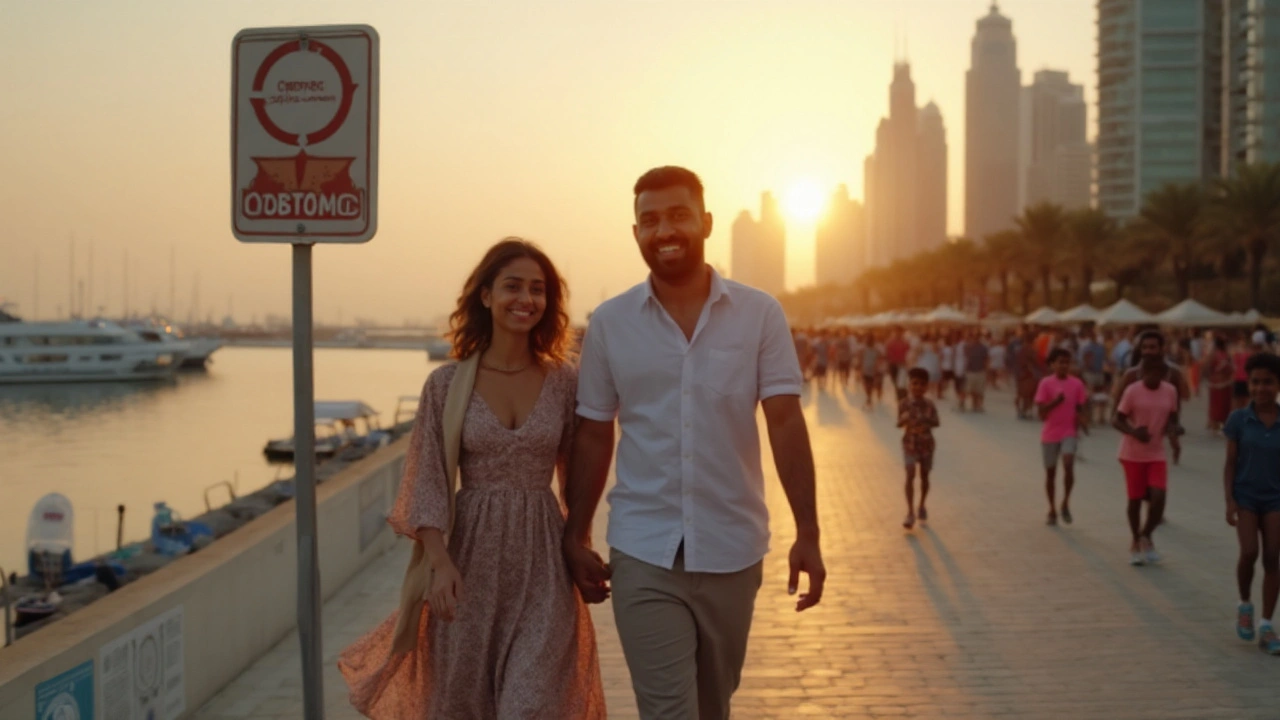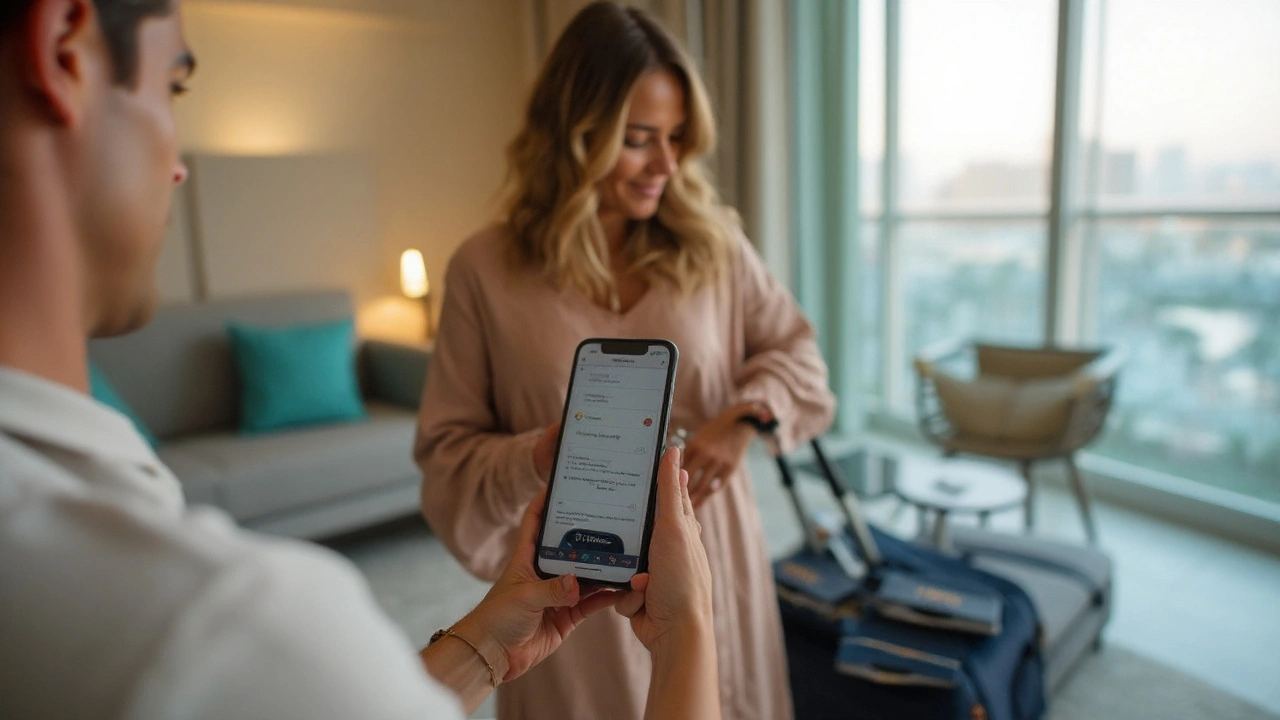TL;DR
- Yes-unmarried couples in Dubai can legally share hotel rooms and live together (since reforms announced in late 2020 and reinforced by the 2021 Penal Code).
- Hotels in Dubai generally don’t require a marriage certificate; passports are standard at check-in.
- Keep public affection low-key; indecency and public drunkenness are still offences.
- Airbnb/holiday homes are fine if they’re licensed; always upload passports to the host/portal if asked.
- Police attention is rare unless there’s a complaint or another offence. When in doubt, be polite, brief, and compliant.
You’re trying to answer a simple question before you book that trip: can you, as an unmarried couple, stay together in Dubai without trouble? Short answer: yes. The legal changes that started rolling out in late 2020 made cohabitation lawful, and by 2025, sharing a hotel room as a couple is normal. That said, there are lines you don’t want to cross-public decency rules, how you handle ID at check-in, and when to keep things low-key.
What you likely need right now:
- Confirm if the law actually allows unmarried couples to share rooms and apartments.
- Know what hotels, apartments, and short-term rentals ask for at check-in.
- Understand PDA, alcohol, and public decency limits so you don’t misstep.
- Get a step-by-step plan you can follow from booking to checkout.
- Have a clear checklist and answers to awkward “what if” scenarios.
What the law says in 2025-and how it plays out on the ground
Dubai sits within the United Arab Emirates, so federal law applies. In November 2020, the UAE announced reforms that decriminalised cohabitation for unmarried couples. That policy shift has been reflected in practice ever since. In 2021, the UAE issued a new Penal Code (Federal Decree-Law No. 31 of 2021), which aligned with these changes and moved the system firmly away from prosecuting consenting adults for living together. Practically speaking, by 2025, hotels and licensed holiday homes in Dubai host unmarried couples every day without fuss.
What this means if you’re visiting:
- Hotel stays: Front desks usually only ask for your passports. Marriage certificates aren’t a thing.
- Holiday homes (Airbnb, Booking, etc.): Legal if the property is licensed. Hosts often need passport scans to register your stay on the local system.
- Residents vs tourists: The rules apply to both, but residents should carry Emirates ID; tourists should carry passports or clear copies.
There are still bright lines around public behaviour:
- Public decency: Heavy PDA can trigger complaints. A quick hug is rarely a problem; making out in public can be.
- Alcohol: Drinking is legal for non-Muslims aged 21+ in licensed venues. Public drunkenness and drunk driving are serious offences.
- Drugs: Zero tolerance. Even residue can lead to arrest.
- Ramadan etiquette: Be discreet with affection, dress modestly in conservative areas, and follow venue guidance about eating and drinking during daylight.
Enforcement reality check: The usual pathway to trouble isn’t “you’re unmarried.” It’s someone complaining about public behaviour, or an unrelated issue (noise, a fight, intoxication) that brings attention. Keep things calm and courteous and you’re very unlikely to interact with police at all.
To anchor this in rules, look to the UAE’s official legal reforms announced in late 2020, then the new Penal Code via Federal Decree-Law No. 31 of 2021. Dubai’s Department of Economy and Tourism also regulates licensed holiday homes, which is why hosts ask for IDs. These are the authoritative frameworks behind what you see on the ground.
Quick guide-what’s allowed in 2025:
| Situation | Dubai 2025 | Notes |
|---|---|---|
| Unmarried couple sharing a hotel room | Allowed | Passports at check-in; marriage certificate not required. |
| Unmarried couple living together | Allowed | Legal since reforms; keep public behaviour discreet. |
| Short-term rental (Airbnb) as a couple | Allowed | Use licensed properties; share IDs when requested. |
| PDA (kissing, cuddling in public) | Low-key only | Brief affection is usually fine; heavy PDA can draw complaints. |
| Alcohol in bars/hotels for non-Muslims 21+ | Allowed | Don’t drink in public spaces; no drunk driving. |
| Same-sex couples sharing a room | Legally sensitive | Same-sex relationships are criminalised; travel as friends and avoid displays of affection, or choose separate rooms. |
| During Ramadan (daytime public spaces) | Be discreet | Follow venue guidance; modest attire and behaviour. |
Three simple heuristics keep you safe:
- Don’t be a spectacle. If it would draw stares anywhere, skip it.
- Keep affection private. Save the kisses for your room.
- Respect venue rules. Hotels, malls, beaches, and mosques can have their own standards-follow the posted signs or staff advice.
Examples to calibrate your radar:
- Fine: Holding hands in a mall. Not fine: Making out on a public beach.
- Fine: Sitting close at a café. Not fine: Drunken behaviour in a lobby.
- Fine: One bed in your hotel room. Not fine: Arguing loudly in the corridor at 2 a.m.

How to stay together smoothly: step-by-step for hotels and holiday homes
Here’s the clean, low-friction way to plan and enjoy your stay as an unmarried couple.
Hotels (the easiest path):
- Pick mainstream, licensed hotels. International chains and well-rated city hotels are the most frictionless.
- Book one room with one large bed. Use standard language-no need to explain you’re unmarried.
- Bring valid ID. Tourists: passports. Residents: Emirates ID. Keep digital copies in your email/cloud as backup.
- Check-in script: Hand over both passports, smile, answer any basic questions (arrival/departure, payment). If a staff member asks whether you’re married (rare), a simple “we’re together” or “we’re traveling together” is enough.
- Mind your manners in common areas. No heavy PDA in the lobby, lifts, or pool.
- If a staff member hesitates: Politely ask for the duty manager. Calmly state you’re aware cohabitation is lawful and you have valid IDs. If they still refuse, request a refund/waiver and book elsewhere; don’t escalate.
Holiday homes (Airbnb, booking platforms, direct rentals):
- Choose licensed listings. In Dubai, legitimate hosts display a permit number (often called a holiday home permit). If unsure, ask for it before you pay.
- Expect an ID upload. Hosts commonly collect passport copies for local registration-it’s normal, and it’s for compliance.
- Arrival logistics: Many buildings have security desks. Your host should pre-authorise your access, or meet you. If a guard asks who you’re visiting, give the host name and unit number.
- Noise and neighbours: Keep it courteous. Complaints (noise, parties) are what bring security to your door.
- Payment and deposits: Read house rules to avoid surprise fees for late check-ins or extra guests.
Going out and about, the low-drama way:
- Dress code: Dubai is relaxed compared to many cities in the region, but modest attire is expected in mosques and some government buildings. Swimwear is for pools and beaches, not malls.
- Transport: Taxis and ride-hailing don’t care about your relationship status. Keep it polite; no obvious PDA in the back seat.
- Bars and clubs: Licensed venues are fine. Keep IDs handy-door staff sometimes check age.
- Beach time: Public beaches are casual, but still keep affection low-key. Private beach clubs are more forgiving, not limitless.
What if you’re stopped by security or police? Unlikely, but here’s the calm plan:
- Stay courteous. Aggression or sarcasm is the fastest way to turn nothing into something.
- Show ID promptly. If asked for where you’re staying or who you’re visiting, answer briefly and truthfully.
- If you don’t understand a request, ask the person to repeat it slowly. Keep your answers short.
- If things feel serious, ask to contact your embassy/consulate and your hotel manager/host. Do not raise your voice.
Special notes for different couples:
- Heterosexual tourists: You’ll blend in at hotels. Keep PDA low-key, and you’re fine.
- Residents: Same basics. Always carry Emirates ID, and keep domestic disputes private-neighbours calling security is the common trigger for issues in apartment buildings.
- Same-sex couples: The law criminalises same-sex relationships. If you still choose to visit, travel as friends, avoid affectionate behaviour, and consider booking twin beds or separate rooms. If that feels stressful, consider destinations where your relationship is fully protected.

Real-world scenarios, checklists, and answers to common questions
Quick checklist: do this, not that
- Bring: Passports (or Emirates IDs), card for incidentals, travel insurance info, digital copies of IDs.
- Book: Reputable hotels or licensed holiday homes with clear reviews and a visible permit number.
- At check-in: Hand over both IDs without commentary. Ask for one bed if that’s what you want.
- In public: Hold hands or a quick hug if you like; skip the make-out session.
- At venues: Follow staff instructions; no drinks in public streets; don’t argue if refused entry-pick a different venue.
- At your rental: Keep noise down; don’t host parties; register guests properly.
- When unsure: Ask politely. In Dubai, staff usually want your stay to be smooth.
Scenarios and how to handle them
- The hotel asks for a marriage certificate: Rare. Say you don’t have one, present passports, and ask to speak to the duty manager. If they hold the line, request a refund and move to another hotel. Don’t debate values; make it practical.
- Your Airbnb host asks for your passports in advance: Normal. Send through the platform’s secure chat. It’s part of legal guest registration.
- Security knocks due to noise: Apologise, lower the volume, and that’s it. Don’t explain your relationship; it’s irrelevant.
- You witness a heated argument in the lobby: Step away. Don’t film. The fastest way to get unwanted attention is to insert yourself.
Mini-FAQ
- Do hotels in Dubai check if you’re married? No. They check passports and take payment. Marriage certificates aren’t part of normal check-in.
- Can unmarried couples share an Airbnb? Yes, if the place is licensed. Provide IDs if asked-hosts often must register guests.
- Is kissing illegal? A brief kiss or a quick hug is usually fine. Prolonged or intimate PDA can be treated as public indecency if someone complains.
- Will the police raid hotels looking for unmarried couples? No. That’s not how things work in Dubai. Issues arise from complaints or other offences (noise, fights, drunkenness).
- What about Abu Dhabi or other emirates? The legal reforms are federal, but local tolerance varies. Dubai is the most accustomed to tourists. Keep it discreet anywhere in the UAE.
- What should we wear? Beachwear at pools and beaches, smart-casual in malls/restaurants, shoulders and knees covered for mosque visits. Follow posted signs.
- What about alcohol licenses for tourists? Visitors can drink in licensed venues. Don’t drink in public spaces, and don’t drive afterwards.
- Is a “boys/girls trip” a problem? Not at all. Groups of friends check into hotels every day. Same advice: keep behaviour respectful.
- We’re residents sharing an apartment-any paperwork? Your lease and Emirates IDs are the main things. Keep noise down and disputes private.
- Can I stay with my partner’s family? That’s a cultural call. Ask the family what they’re comfortable with; some prefer separate rooms.
Trade-offs and small print you shouldn’t ignore
- Luxury vs budget stays: Big, international hotels are the least fussy. Ultra-budget places might be inconsistent. If a desk agent is old-school, you don’t need a legal lecture-just move to another property.
- Holiday home value vs convenience: Apartments give more space and privacy, but you might deal with building security and ID uploads. If you’re anxious, stick to hotels.
- Nightlife vs quiet evenings: Nightlife is lively and legal in licensed venues. The risk is leaving obviously intoxicated-taxis are plentiful, use them.
How the legal backdrop supports all this
Since late 2020, the UAE publicly reformed personal freedoms, including decriminalising cohabitation for unmarried adults. The new Penal Code, issued as Federal Decree-Law No. 31 of 2021, reflects that shift. Dubai’s Department of Economy and Tourism regulates holiday homes and expects hosts to register guests properly (hence the ID requests). These are the primary, authoritative touchpoints behind the day-to-day reality you’ll experience in 2025. You don’t need to wave law names at a receptionist-but it helps to know that what you’re doing is squarely within the legal norm.
Red flags to avoid
- Arguing morals at a front desk. It won’t help. Either it’s a staff misunderstanding, or it’s a hotel policy you can’t change-vote with your feet.
- Getting handsy where kids/families are present. That’s what triggers complaints.
- Posting edgy public content on social media. Don’t create a record of behaviour that could be read the wrong way.
- Assuming “anything goes” because it’s a big city. Dubai is welcoming and orderly, not permissive.
Simple decision helper
- If you want zero admin: Book a mid-range or international hotel, bring your passports, keep PDA light. Done.
- If you want a kitchen and more space: Book a licensed holiday home with great reviews, send IDs ahead, and keep neighbour noise to a minimum.
- If you’re worried about awkward questions: Email the hotel politely before booking (“We are two adults traveling together; please confirm one king bed.”). Keep their confirmation.
Next steps / Troubleshooting
- Tourists on a first trip: Book a known hotel brand in Downtown, Dubai Marina, JBR, or near the Palm. You’ll blend in with thousands of other visitors.
- Budget travelers: If a guesthouse seems fussy, don’t force it. Move to a different property with stronger reviews from couples.
- Couples visiting during Ramadan: Book hotels with on-site restaurants; follow the hotel’s guidance on eating/drinking in daylight hours and keep affection extra low-key in public.
- Residents moving in together: Put both names on the lease if practical, learn your building’s guest policies, and keep domestic issues private.
- Same-sex couples: The safest path is choosing destinations where your relationship is protected. If you still go, travel as friends, use twin beds or separate rooms, and keep things strictly discreet.
- If something goes sideways: Stay calm, ask for the duty manager, present IDs, keep answers brief and factual. If needed, request to contact your embassy/consulate.
Bottom line: In 2025, unmarried couples can share rooms and apartments in Dubai without drama. Bring IDs, pick well-reviewed licensed places, keep your affection private, and focus on what you came for-sun, food, and a seamless city break.
